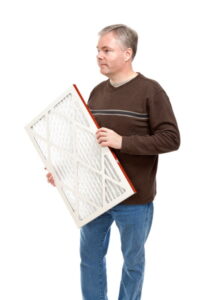As the chill of winter settles in, our heating systems become our trusted companions, working tirelessly to keep our homes warm and comfortable. Amidst the appreciation for cozy interiors, there’s an unsung hero in the heating system—the air filter, which works for both your heating and air conditioning system.
In this post, we’ll delve into the crucial role air filters play in maintaining the efficiency of heating systems, exploring why regular maintenance and the right filter choice are essential.
The Function of Air Filters in Heating Systems
Air filters are not mere accessories; they are the frontline defenders of your heating system’s internal components. Their primary function is to trap dust, debris, and other particles, preventing them from infiltrating critical parts like the furnace or heat exchanger. By doing so, air filters ensure that the system operates smoothly, reducing wear and tear on vital components and promoting longevity.
Importance of Regular Air Filter Changes
Imagine a barrier so clogged that it impedes the flow of air. This is precisely what happens when air filters are neglected. Over time, filters accumulate dirt and contaminants, hindering the system’s efficiency. The consequences of overlooking filter replacement can be severe, ranging from increased energy consumption to potential damages to the entire heating system. Regularly changing air filters is a simple yet effective measure to prevent such issues.
Standard Air Filters vs. Whole-House Filters
Not all air filters are created equal. Standard air filters, while essential for basic protection, fall short when it comes to improving indoor air quality. They focus primarily on preventing larger particles from entering the heating system but do little to address finer particles and allergens circulating in the air. This is where whole-house filters come into play—and addition you can have placed into the HVAC system.
Whole-house filters, professionally installed, go beyond the standard by enhancing indoor air quality. These filters capture smaller particles, including allergens, dust mites, and pet dander, providing a comprehensive solution for a healthier living environment. Investing in whole-house filters not only benefits your heating system but also contributes to the overall well-being of your household.
Benefits of Whole-House Filters
The advantages of whole-house filters extend beyond improved air quality. These filters contribute to a cleaner and healthier living space by reducing allergens that can exacerbate respiratory issues. Additionally, whole-house filters require less frequent replacement compared to standard filters, offering both convenience and long-term cost savings.
Selecting the right whole-house air filter involves considering factors such as Minimum Efficiency Reporting Value (MERV) ratings and filter materials. Higher MERV ratings indicate better filtration capabilities, but it’s essential to balance this with the specific needs of your heating system and indoor air quality requirements. Consulting with HVAC professionals can provide valuable insights into the most suitable filter for your unique situation.
Tips for Air Filter Maintenance
Taking a proactive approach to air filter maintenance can enhance the performance of your heating system. Changing air filters is a simple task that can be performed by homeowners. It’s recommended to replace standard filters every 1–3 months and whole-house filters every 6–12 months, depending on usage and environmental factors.
At Hometown Heating and Air Conditioning, Your Comfort Is Our Business! Contact us today for all your heating and cooling needs.

